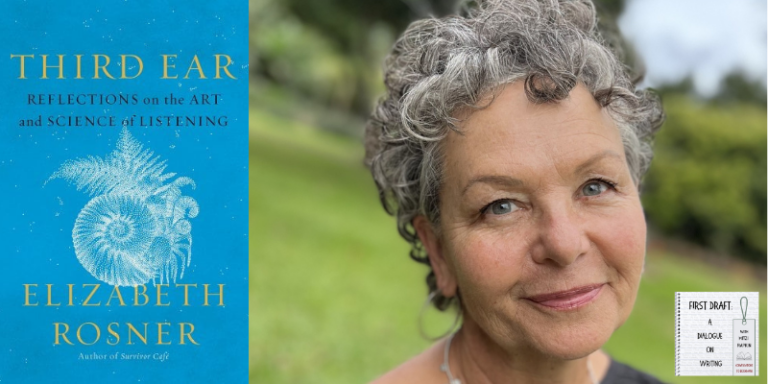Elizabeth Rosner on Delayed Listening

First Draft: A Dialogue of Writing is a weekly show featuring in-depth interviews with fiction, nonfiction, essay writers, and poets, highlighting the voices of writers as they discuss their work, their craft, and the literary arts. Hosted by Mitzi Rapkin, First Draft celebrates creative writing and the individuals who are dedicated to bringing their carefully chosen words to print as well as the impact writers have on the world we live in.
In this episode, Mitzi talks to Elizabeth Rosner about her new work of non-fiction, Third Eye: Reflections on the Art and Science of Listening.
Subscribe and download the episode, wherever you get your podcasts!
From the episode:
Mitzi Rapkin: You know, a lot of this book is you going over your relationship with your parents and there are many moments where you’re talking about feeling unheard by them, and that is maybe a counterpoint to listening, although feeling unheard can be different than being listened to, because some of it’s just generated within you, and maybe it’s accurate and maybe it’s not accurate. I’m curious how writing this book in this context maybe made you feel about being heard.
Elizabeth Rosner: Well, one of the things I write about toward the end of the book is something that, I guess for shorthand, people call delayed listening, where after having heard something, after thinking you’ve listened deeply and fully to something, only reflecting later, sometimes days, months, years, maybe even decades later, a new level of understanding can come through. A new level of interpretation can come through. And so I think one of the things that happened for me in the writing of this book and taking that big arc of life with my parents, and especially with my father, who lived to the age of 93 was that I was able to see how listening could evolve over time and that even listening all the way back into my childhood, I could have a new level of understanding of my parents and myself. And so, I think as much as the book traces new listening practices or current listening experiences, it also, I think, reminded me, and I hope people who read the book, that you can listen backwards. You can listen to something of yourself in an earlier time of your life, and maybe a painful conversation you had, or a painful feeling of not being heard, and you can replay it sometimes you know in your memory, in your mind, and make a new discovery about that. And so that did happen for me, especially with my father.
***
bio